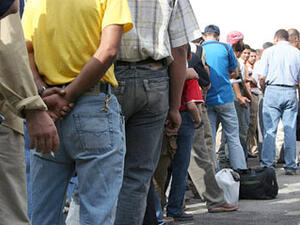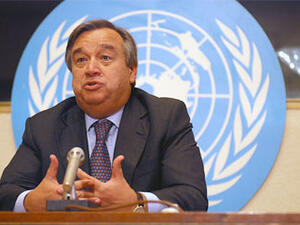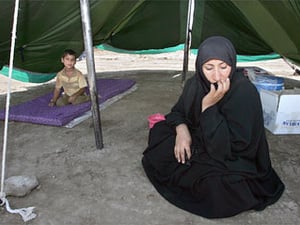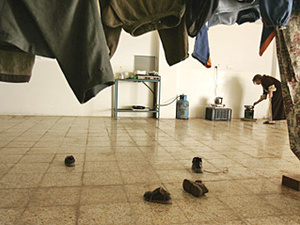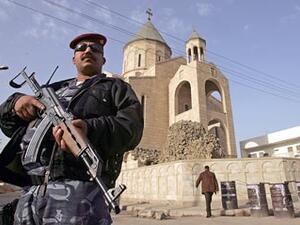Iraq conference next week
Iraq conference next week
First, an update on the April 17-18 conference here in Geneva on addressing the humanitarian needs of refugees and internally displaced people in Iraq and the region. In terms of participation, we have heard from numerous governments, international organisations and NGOs. Among the many who have indicated they'll be attending are several Iraqi officials, including the Minister of Displacement and Migration; the Syrian Deputy Foreign Minister; the Special Representative of the Secretary-General for Iraq; Sweden's Minister for Asylum and Migration Policy; Italy's Vice Minister of Foreign Affairs; Norway's Deputy Minister of Foreign Affairs; the US Under-Secretary of State and the US Assistant Secretary of State; the European Commission's Director-General of Humanitarian Affairs; the UN Under-Secretary-General for Humanitarian Affairs and Emergency Relief Coordinator; the Commissioner General of UNRWA; the Director-General of IOM; the heads of the Iraqi, Lebanese, Syrian, Jordanian, Egyptian, Kuwaiti, and Emirati national Red Crescent Societies, as well as several other national Iraqi NGO. More responses are coming in daily.
The conference, which will be chaired by UN High Commissioner for Refugees António Guterres, will be held over one and a half days in the Assembly Hall, beginning at 10 a.m. on April 17 and ending at 1 p.m. on April 18, followed by a press conference by Mr. Guterres at 1:15 p.m. in the Council Chamber. Although the conference will be a closed meeting, there will be media access for the opening on April 17, including opening remarks by Mr. Guterres. A media centre will be available during the conference and UNHCR spokespeople available to provide updates. Press kits will be provided. Accreditation is being handled by the Press and External Relations Section here at the Palais and television and radio arrangements through Yvette Morris in the Palais TV and Radio Section. Some of the delegations may want to arrange their own press briefings and these will be announced as warranted.
Why a humanitarian conference now? Although the world is aware of the military and political situation in Iraq, the immense and growing humanitarian needs are not well-known. In fact, until the last year to 18 months, we had actually seen some 300,000 Iraqis return home to begin rebuilding their lives since 2003. But that initial return trend has dramatically reversed itself since 2005-06, particularly since the Samara bombing in February 2006. Now, growing numbers of Iraqis are leaving the country. Spiralling levels of sectarian, political and criminal violence, dwindling basic services, loss of livelihood, inflation and uncertainty about the future have all contributed to an exodus now estimated at 40,000 to 50,000 a month fleeing their homes inside Iraq. Since most of those who have fled have not gone to camps, the movement has not been so obvious. But it is enormous nonetheless and those who have fled are becoming increasingly desperate as they and their host communities run out of resources.
So the idea of next week's conference is to alert the international community to the humanitarian dimensions of the displacement crisis in and around Iraq and to forge an ongoing international humanitarian partnership to alleviate suffering, to provide protection and to share the burden with those countries and communities that have so far borne the brunt of the crisis. It will be humanitarian in nature and will involve countries in the region and major donors and interested governments as well as non-governmental organisations and other partners. It is not a pledging conference, but rather a forum for awareness, advocacy and ongoing action on specific humanitarian needs. Those needs will be outlined for governments who will be asked to join together with international organisations and NGOs to focus on specific needs in an ongoing process of international partnership and burden-sharing. This can be through bilateral support to ease the strain on the current refugee-hosting states; through financial support or capacity-building; through more funding for IDP and refugee protection and assistance programmes; through improving the quality of protection for the uprooted; through providing resettlement opportunities for the most vulnerable; and through development of targeted responses to specific problems, including finding solutions for those groups most at risk.
We hope to hear commitments on all of these aspects next week because the international community needs to focus collectively on the whole range of humanitarian needs. Some 2 million Iraqis are now in neighbouring countries in the region, many of whom were uprooted prior to 2003. But we also need to focus on the estimated 1.9 million Iraqis who remain displaced inside their own country, many of them in increasingly desperate conditions. While many were also displaced before 2003, we estimate that just since the beginning of last year nearly 730,000 Iraqis have become newly displaced by sectarian violence and more are fleeing their homes daily.


